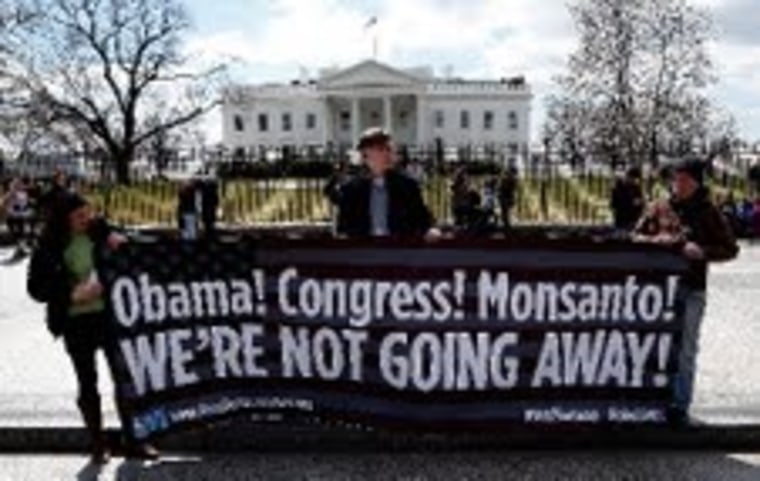They say you are what you eat, but as more of our food becomes genetically modified, we know increasingly less about what we are consuming. On Sunday's Melissa Harris-Perry, Melissa will look at one of the nation's biggest producers of GMOs: Monsanto. After a five-to-four Supreme Court decision in 1980 held that living organisms could be patented, Monsanto has become known as the "seed police" for aggressively enforcing the use of their genetically modified seeds. Get caught up on the lawsuit now in the Supreme Court that challenges those patent laws.
Since 2005, Monsanto has purchased top companies producing fruit, vegetable, cotton and soybean seeds. Those acquisitions have led to outcomes like Monsanto's estimated 90% control of all soybean production in the nation. As the company has increased its share of the seed market, it has also raised concerns about the safety of the genetically modified crops they produce. That concern was only intensified when President Obama signed a continuing spending resolution that included a "Farmer Assurance Provision."The provision mandates that federal courts cannot intervene in the planting or selling of GMOs, even if they have been deemed hazardous to the public. Join us at the top of the show as we ask: do we have any idea how safe genetically modified food actually is?
MHP will also be sharing insights from her latest book, Sister Citizen, and using them to ask if our understanding of immigration is gendered. The Senate Committee on the Judiciary addressed that question at a hearing on Monday titled "How Comprehensive Immigration Reform Should Address the Needs of Women and Families."
If you loved NPR's article "When Our Kids Own America," you'll want to check out the new memoir Birds of Paradise: How I Became Latina by Raquel Cepeda. The author will join the show to discuss culture, hip hop, and racial identity in America.
And with adoption in the headlines for the Supreme Court "Baby Girl" case, we'll be asking Kathryn Joyce about a trend in adoption we don't often hear about: the evangelical Christain adoption movement and its global impact on families, child trafficking, and our understanding of adoption.
Watch Melissa Harris-Perry Sunday at 10 AM ET on msnbc.
Update: Monsanto, during the show, sent us a statement. Melissa read a portion on-air; below is the full statement, as typed.
About MonsantoMonsanto is a company committed to improving agriculture to improve live. Our primary focus is on enabling both small-holder and large-scale farmers to produce more from their land while conserving more of our world's natural resources such as water and energy. We apply modern-day agriculture sciences such as plant-breeding, biotechnology and other agronomic practices to develop and support products for farmers around the world. You can learn more about our business at www.monsanto.com and more about these three areas of science specifically online at: http://www.monsanto.com/products/Pages/monsanto-science-and-research.aspx.We are proud to be recognized as one of the world’s leading innovative companies http://www.monsanto.com/careers/Pages/company-awards-recognition.aspx, one of the top 100 corporate citizens http://monsanto.mediaroom.com/2013-04-15-Monsanto-Company-Named-One-Of-CR-Magazines-100-Best-Corporate-Citizens and as one of the top 25 multinationals to work for globally http://monsanto.mediaroom.com/2012-11-14-Monsanto-Company-Named-One-Of-The-Worlds-Best-Multinational-Workplaces.About Safety of Crops improved through plant biotechnologyMonsanto is one of literally dozens of public and private sector representatives that invest in developing crops improved through plant biotechnology. Monsanto and its more than 21,000 employees globally personally care about food safety just as everyone else does. The food and feed safety of biotechnology products has been firmly established through numerous scientific studies and expert reviews. These products are more rigorously tested than any other food product available today. It is estimated that crops improved through biotechnology, which have been developed by both the public and private sector, have been planted on more than 3 billion acres around the world over the last two decades. In addition, it is estimated that 3 trillion meals containing ingredients from biotech crops have been consumed with no reliable documentation of any food safety issues for people or animals. This is a flawless safety record with the products that have been commercialized. This safety record is something that many industries would like to have.You may also refer to the following materials regarding the safety of our products.· Institute of Food Technologists (IFT) Expert Report: Biotechnology and Foods <http://www.ift.org/Knowledge-Center/Read-IFT-Publications/Science-Reports/Expert-Reports/Biotechnology-and-Foods.aspx> (2000)· National Research Council/U.S. National Academy of Sciences (NAS) report on the Safety of Genetically Engineered Foods: Approaches to Assessing Unintended Health Effects <http://www.nap.edu/openbook.php?isbn=0309092094> (2004)· National Research Council/U.S. National Academy of Sciences (NAS) report on the Impact of Genetically Engineered Crops on Farm Sustainability in the United States <http://www.nap.edu/openbook.php?record_id=12804&page=R1> (2010)· Society of Toxicology (SOT) Position Paper: The Safety of Genetically Modified Foods Produced through Biotechnology <http://www.toxicology.org/ai/gm/gm_food.asp> (2002)· World Health Organization (WHO). Modern food biotechnology, human health and development: an evidence-based study <http://www.who.int/foodsafety/publications/biotech/biotech_en.pdf> (2005)Plant biotechnology adoption globallyBiotech crops have proven to be a valuable tool chosen by millions of farmers around the world. A record 17.3 million farmers chose to grow biotech crops worldwide in 2012. Over 90 percent of these farmers, or more than 15 million, were small resource-poor farmers in developing countries. In 2012, 28 countries planted biotech crops – of which, 20 were developing and 8 were industrial countries. This adoption represents millions of independent decisions by millions of farmers – around the world – that selected products that can help them farm and meet the needs of their customers (ISAAA, http://www.isaaa.org/resources/publications/briefs/44/pressrelease/default.asp.).Farmers choose to adopt the technology because it is scale-neutral and provides a range of benefits from protecting to preserving yield, reducing inputs (e.g. fuel savings, reduced crop inputs and easier adoption of agronomic practices) to improving their own welfare (e.g. economics, cost-savings to quality of life).
